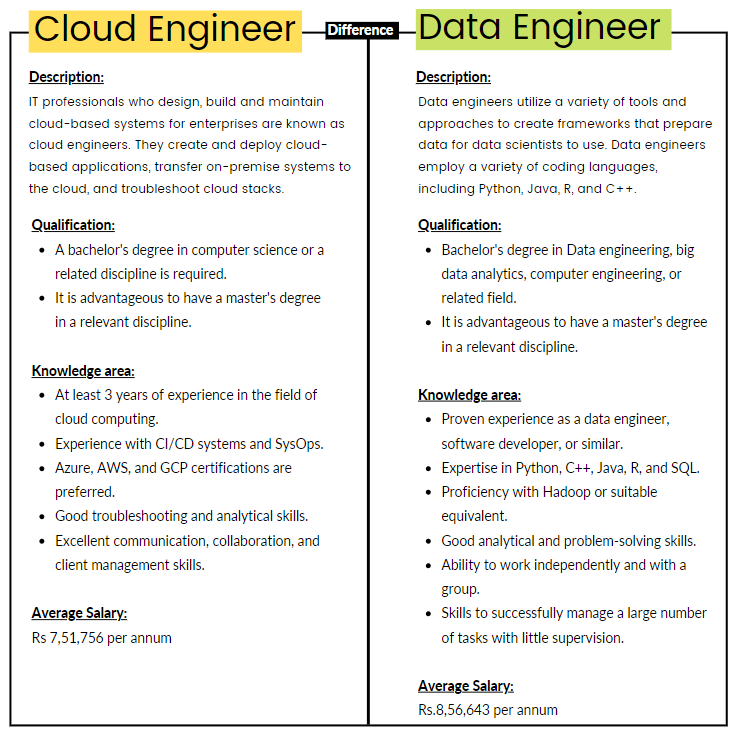The rise of cloud computing and big data has led to the emergence of new job roles in the technology industry, including Cloud Engineers and Data Engineers. While both roles are crucial for businesses to leverage technology to their advantage, they have distinct differences in terms of their responsibilities, skillsets, and opportunities.
Cloud Engineers focus on designing, building, and maintaining the infrastructure and systems required for cloud computing. They are responsible for ensuring that the cloud environment is secure, efficient, and scalable. On the other hand, Data Engineers are responsible for designing, building, and maintaining the data infrastructure required for processing, storing, and analyzing large volumes of data.
In this blog post, we will explore the differences between Cloud Engineers and Data Engineers in more detail, including their job responsibilities, required skillsets, and the opportunities available for professionals in these fields. By understanding these differences, readers will be better equipped to decide which path they want to pursue and what skills they need to develop to excel in their chosen field.
Cloud Engineering
Cloud computing is rapidly changing the way IT infrastructure and organizations operate. As a result, the popularity of acquiring essential skills has become valuable in tech companies. Many leading technology companies are now offering cloud services and solutions, further increasing demand. If you want to start your career or switch to cloud computing, this is the place to be. Because the demand for software engineers, developers, and administrators with relevant cloud knowledge and skills benefits organizations adapting to the cloud ecosystem.
Cloud engineering is a profession in which professionals systematically use engineering applications on various types of cloud computing such as Infrastructure-as-a-Service (IaaS), Platform-as-a-Service (PaaS), Software-as-a-Service (SaaS), and Serverless computing. Cloud computing is vast, and cloud engineering takes a systematic approach to provide businesses with relevant tools and approaches for utilizing cloud platforms for commercial purposes. Analyzing, designing, developing, operating, managing, and maintaining cloud computing services and solutions are also important aspects of this profession. Cloud engineers’ primary responsibility is to solve business problems systematically and cost-effectively by leveraging the power of cloud computing.
Data Engineering
Recently, organizations have been producing massive amounts of data. Organizations face challenges such as analyzing, optimizing the flow and pipelining this data. To deal with these difficult factors, the data engineering profession arose. Data engineering is concerned with using engineering applications to collect data trends, analyze them, and develop algorithms from various data sets to improve business insights.
The role of data engineering is very important in the IT industry. Data engineering employs data that can be effective in use to achieve business objectives. Handling large and complex datasets and databases necessitates data engineering skills; thus, companies are constantly on the lookout for qualified data engineers. Data engineering also provides deeper insights into all of an organization’s data sets to visualize them for better understanding. This role also includes preparing data for predictive modeling and automating tasks based on the analysis.
Roles and Responsibilities of a Cloud Engineer
A cloud engineer is a professional who is in charge of evaluating an organization’s IT infrastructure and providing solutions for migrating and managing many business applications and functions in the cloud environment. Cloud engineers are professionals who assist and support businesses in migrating critical business applications and processes to various cloud types such as private, public, hybrid, and community clouds, among others.
Cloud engineers are responsible for a variety of technical tasks in and around cloud computing. Implementing cloud solutions for businesses by planning, developing, and designing cloud-based software and applications is one of them. In addition, you must constantly manage cloud environments and troubleshoot any issues that may arise. A cloud engineer’s critical task also entails working and collaborating with other professionals and technical teams to identify and implement cloud solutions.
Because the majority of cloud services are web-based, cloud engineers are involved in the development and design of multiple web services within the company’s various cloud environments. Certain business functions and processes must sometimes be automated on the cloud, and cloud engineers devise methods to accomplish this on cloud platforms. Cloud engineers, like all other technical professionals, must stay current on industry trends, new technology applications, cloud solutions, and certifications.
Roles and Responsibilities of a Data Engineer
A data engineer is an IT professional who analyses, optimizes, and develops algorithms based on data by the goals and objectives of the company. Data engineers seek data sets to improve the way businesses manage resources such as capital, infrastructure, and people to grow their businesses. With today’s technology, there are numerous tools available to assist data engineers in their work with data.
Data engineers are in charge of optimizing data retrieval, as well as developing interfaces and mechanisms for data flow and access. These works can help data scientists experiment with data for big data applications even more. To represent data trends to stakeholders, data engineers must be able to create dashboards, reports, and other visualizations.
Data engineers would be well-versed in data storage and manipulation tools such as SQL, Hadoop, Spark, NoSQL, and other high-tech tools. Some of them work in smaller teams or for small businesses and are in charge of data processes; such as managing, analyzing, and optimizing. Data engineers build data stores and pipeline systems for data scientists in midsized and large organizations where data roles are broadly classified. This enables data scientists to generate insights for practical use by querying and combining large amounts of data. Data engineers also work on data warehouse systems.
Data engineers are in charge of managing, organizing, developing, building, testing, and maintaining data architectures. To improve data reliability, efficiency, and quality, complex analytics, machine learning, and statistical processes are sometimes in use in conjunction with programming languages and other tools. Finding hidden data patterns in large data sets to research industry and business requirements is a critical task as well.
Cloud Engineer Skills Required
Because cloud computing is such a broad field, a cloud engineer must have a solid understanding of and command of the majority of the following skills.
Cloud Services and Providers: The implementation of cloud services and solutions offered by many cloud providers is at the heart of cloud computing. Cloud engineers must be well-versed in major cloud providers such as Amazon Web Services (AWS); Microsoft Azure, Google Cloud Platform, and others, as well as their services and solutions.
Coding: Cloud platforms support and allow developers to use a wide range of programming languages, including Java, Python, C++, JavaScript, PHP, and others. It is critical to be fluent in multiple programming languages to write code in the cloud.
Operating System: An understanding of one or more operating systems, such as Windows, Linux; and other open-source operating systems, is required to develop applications and software.
Databases: A good understanding of database querying languages such as SQL, Hadoop, and MySQL is beneficial.
Networking Fundamentals: Networking fundamentals and integration with cloud platforms are required. To provide a good user experience, have good knowledge of creating and deploying virtual networks.
Security: Organizations always take precautions to safeguard their data and applications. Cloud engineers must be able to track the security status of cloud platforms and implement preventive measures.
Web Services and APIs: Understanding web services such as XML, SOAP, and others to transfer and describe data; while using APIs to complete and deploy the integration across different platforms. Because cloud services are mostly web-based; develop a basic understanding of various APIs and web services.
Data Engineer Skills Required
Data engineers typically have a background in computer science or engineering. The position necessitates technical knowledge in IT as well as knowledge of analytics and mathematics disciplines. Some of the following abilities are essential for an aspiring data engineer.
- SQL, NoSQL, and MySQL database administration
- Python, Scala, Java, and other programming languages
- AWS S3 or MongoDB, for example, are examples of distributed data storage systems.
- Apache Spark and Map Reduce are two examples of distributed data processing systems.
- Cloud Computing Platforms: AWS, GCP, and other cloud providers’ services
- Frameworks include JVM-based frameworks and Apache Hadoop.
- The Linux operating system
- Warehouse of data
- Modeling of data
- ETL is an abbreviation for End- (extra, transform, load)
- Analytics based on big data
- creation of software
Which one is better – Cloud Engineer or Data Engineer?

Without a doubt, the cloud engineering profession has proven to pay significantly higher average salaries than other jobs. According to research, many cloud engineers earn an annual salary of around 124,000 USD. However, the average salary varies depending on geography, knowledge, industry experience, and education levels.
In addition, the average salary for a data engineer is higher. Data engineers earn an average of USD 109,000 per year. The average salary, however, can vary depending on certifications, geography, knowledge, industry experience, and education levels.
Finally, deciding which of the two professions is best for you is a function of your situation and the types of jobs you want to pursue. The factor that determines whether cloud engineering or data engineering is superior from an individual standpoint is linked to your priorities. If salary and career advancement are important factors, take the time to look up jobs in both roles; and see what companies are looking for in candidates. See where the majority of your priorities and deciding factors align between cloud and data engineering; the one with the majority is the better choice.
Conclusion
Thousands of IT engineers deal with a wide range of engineering, architectural, administration, analysis, and other aspects. The real challenge arises when we must choose a career path; or job role from among the trending and popular ones. Hurry up and decide what role you want to play by taking the free practice tests for Cloud Engineer and Data Engineer.

